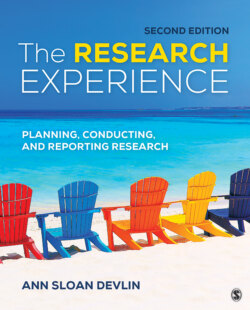Читать книгу The Research Experience - Ann Sloan Devlin - Страница 67
На сайте Литреса книга снята с продажи.
Other Databases and Indexes in the Social Sciences
ОглавлениеIt is important to be familiar with commonly used databases. Some of the most common databases and indexes in the social sciences are Academic OneFile, Web of Science, PsycINFO, Scopus, SocINDEX, Anthropology Plus, AnthroSource, and Science Direct. Often, under the heading Databases and Indexes, there is the option to access the list alphabetically or by subject. For example, in many library systems, if you click on “listed by subject” under Databases and Indexes (to find journal articles), a list of subject areas appears alphabetically (e.g., from Africana Studies to VAST: Academic Video Online). You can click on the subject area of interest (e.g., education, psychology, or sociology) and a list of the databases in that subject area appears. The other option is an alphabetical list of databases and indexes, for example, from A and ABI/Inform to W and WorldCat. If you don’t know the names of the databases typically used in your field, then the subject listing is a better starting point.
Google Scholar is a search engine that searches academic resources. The results of a search in Google Scholar should not be confused with the results of a search you would get from a general Google search (more on that soon), which would include public Web content. There is a link to Google Scholar on the Databases page of my institution’s electronic library resources, reflecting the fact that the library staff members think Google Scholar is an acceptable tool for scholarly work. There is some research suggesting that the results of a Google Scholar search produce citations as scholarly as those from an equivalent database search (Howland, 2010). Is Google Scholar recommended over a database such as PsycINFO? Although there is overlap, Google Scholar may not provide as much access to full text links as traditional library databases do, increasing the number of steps you need to take to obtain those full texts.
Google Scholar: Search engine for academic resources.
JSTOR: Electronic database that provides access to articles usually 3–5 years (the moving wall) behind the current issue.
Project Muse: Electronic database of current articles that includes more than 600 scholarly journals in the social sciences and humanities.
Nexis Uni: Electronic database, which is almost always full text and covers approximately 11,000 sources of news, business, legal, medical, and reference publications.
